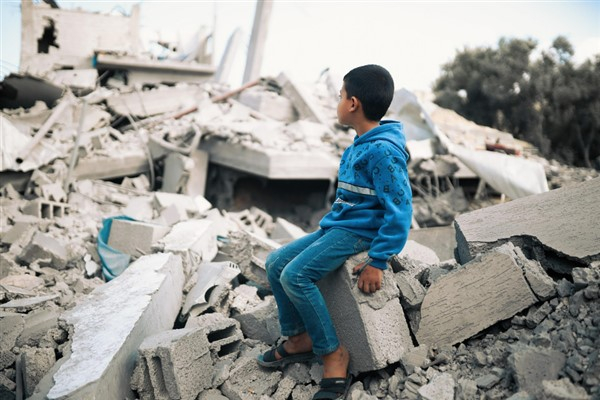The alliance with Russia, the balances… China and Russia are now in the best relations they have had since the late 1950s. Although they do not have a formal alliance, the two countries have an informal agreement to coordinate diplomatic and economic moves and form an alliance against the United States. Today, the interests of China and Russia are also not entirely compatible. The alliance of the two countries is naturally related to creating a higher anti-American bloc, and we can say that this includes some elements that make China's alliance with Russia risky.
Russia-Ukraine peace or ceasefire situation… Russia is struggling in Ukraine and will likely have to settle for a peace with limited gains. We can understand this by the fact that the demands do not include all of Ukraine and are limited to disputed regions such as the Donbas. Even if Ukraine will show significant resistance to Russia and perhaps become the losing side at the end of the war, it will not have given Russia the opportunity to fully enjoy a victory. At the same time, Putin can limit his wishes in order to maintain his regime. It is also necessary to separate the concepts of peace and ceasefire. Final peace seems difficult due to territorial disputes. It should be noted that in the meeting between the delegations held in Istanbul, the topics were on the security guarantee and the ceasefire.
The aggressiveness of Russia, the nuclear issue, and the conflict with NATO are factors that will make it undesirable and impossible to get out of. The embargoes, on the other hand, put Russia back economically and narrow its range of action. Even if Russia beats Ukraine on the field, economic sanctions push the situation on the table towards an irrelevant risk-reward ratio.
The role and interactions of the US… The US has created the opportunity to turn the balances in their favor, both politically/militarily and economically. While the diplomacy of France and Germany before the war was in vain, there is the issue of these countries participating in sanctions within the NATO alliance, feeling a bit obligatory. While an unprecedented economic/financial embargo and political isolation were imposed on Russia, a political equilibrium was formed in which even countries such as Sweden and Switzerland occupied a place in the Western camp and that remaining neutral would be perceived as appearing on the other side. This situation will force third countries that want to remain neutral and they will be forced to choose between Russia and the US camp. The desire to be economically isolated and not subject to sanctions will force many countries to stand by the Western camp, that is, to side with the United States, unless there is an anti-American ideology.
From an economic point of view, the energy card will be a cumulative gain from the fact that the US has been on the market as a producer for several years and re-exporting oil. The US is currently trying to impose an embargo on Russian energy. For this purpose, while putting forward solutions to replace the deficit, such as making the OPEC bloc produce more oil and shipping liquefied natural gas under favorable conditions, it also intends to sell its own American type of oil to the EU. The energy-dependent EU will either rely on Russian resources and hold back politically in order not to be affected by the economic crisis, or it will depend on the US. The US will have a card in their hands, like the energy version of the Marshall aid that it applied after the Second World War.
Political balances, geographical containment… The agreement between the US and Russia in 1997 included the fact that NATO would not expand eastward, and that it would not include the former Soviet countries and Russia's border neighbors. This condition was violated and NATO included many former communist bloc countries, including the Baltic republics. The inclusion of Ukraine will mean the encirclement of the Black Sea by NATO, a situation that also blocks Russia's southern route.
There are many elements of siege in China's area. China, seeking to seize Taiwan, will face Japan and the United States in the Pacific and China Sea, while being surrounded by Japan and South Korea in technology trade. It should also be noted that the Biden administration did not end the trade war that Trump started. Units such as QUAD (Quadrilateral Security Dialogue; Australia, India, Japan, US) and AUKUS (Australia, UK, US) will be on the alert against possible Chinese aggression and are actually set up against a security threat from China.
Conclusion? The Cold War, in which the capitalist and communist order fought, seems to leave its place to a new Cold War II, which opposes the Western-type democracy and the Eastern-type authority order. The territorial claims of the countries, both in terms of economic interests and historical and cultural ties, make this work more military mobility points, and the economic consequences of this are negative. At least, we can give an example of the effect of global inflation currently experienced in commodity prices. Regarding the support of the Ukrainian camp, of course, no one is doing this for the sake of the democratic order or the advocacy of the capitalist order. There are purely economic relations and interests. The determinant of the global financial system, the USA is also the guiding force here. US – Russia and US – China struggles are in different areas; The first is on the political side, the second on the economic side. The USA's dream is a Russia moving away from Europe and the Black Sea, imprisoned in the Ural steppes, Siberia and Eurasian land, and on the other hand, the USA's oligopoly that a few countries (Japan, South Korea, EU, India) has entered with limited permission. a China pushed out of the market.
Kaynak Tera Yatırım
Hibya Haber Ajansı






